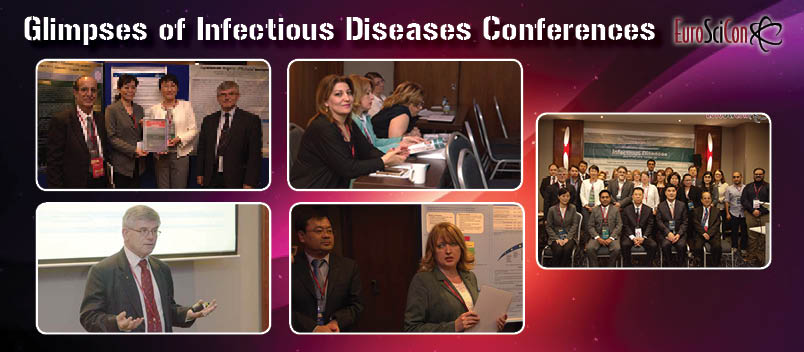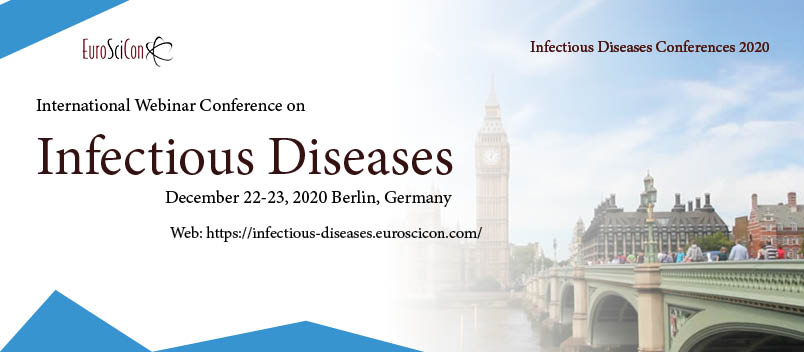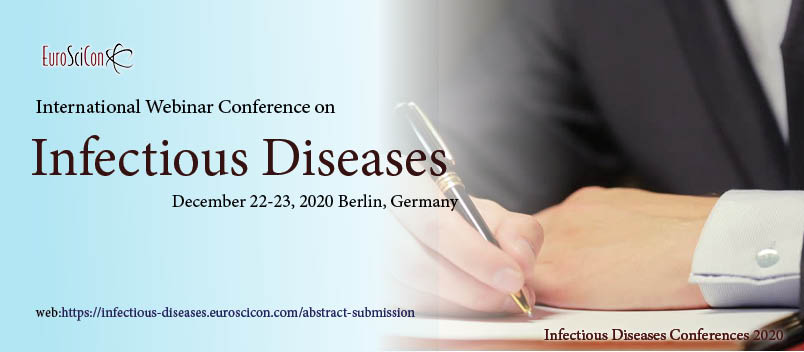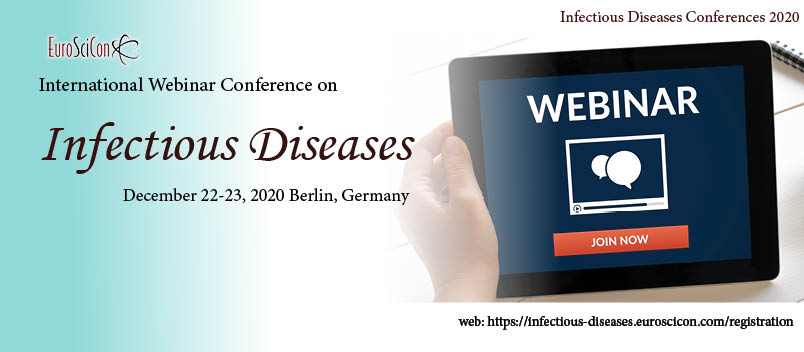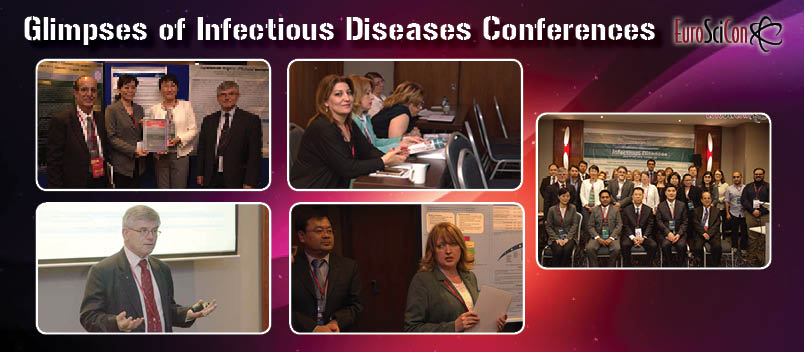Infectious Diseases Conferences
About Conference
International Conference on Infectious Diseases will be organizing webinars by offering virtual platform to all academicians, researchers, industry professional, scholars. Webinars will be scheduled on wide range of topics and it will be helpful for scientific fraternity to be connected while staying at their preferred place. Join the webinars organized by us and let the world know about your research and innovation. The Infection Control conference hosting presentations from editors of eminent refereed journals, renowned and active investigators and decision makers in the field of infectious diseases, microbiology, immunology, infection control and prevention. Infection control 2019 Organizing Committee also invites young investigators at each and every career stage to submit abstracts reporting their latest scientific research in oral and poster sessions
Sessions & Tracks
Track: 1 Corona Virus Diseases
coronavirus is a provisional name given to coronaviruses of medical significance before a permanent name is decided upon. Although coronaviruses are endemic in humans and infections normally mild, such as the common cold (caused by human coronaviruses in ~15% of cases), cross-species transmission has produced some unusually virulent strains which can cause viral pneumonia and in serious cases even acute respiratory distress syndrome and death.
Track 2: Bacterial Infectious Diseases
Bacteria common noun bacteria, singular bacterium is a type of biological cell. They constitute a large domain of prokaryotic microorganisms. Typically, a few micrometers in length, bacteria have several shapes, ranging from spheres to rods and spirals. Bacteria were among the first life forms to appear on Earth and are present in most of its habitats. Bacteria inhabit soil, water, acidic hot springs, radioactive waste, and the deep biosphere of the earth's crust. Bacteria also live in symbiotic and parasitic relationships with plants and animals.
Track 3: Antigen-antibody reactions
Antigen-antibody interaction, or antigen-antibody reaction, is a specific chemical interaction between antibodies produced by B cells of the white blood cells and antigens during immune reaction. The antigens and antibodies combine by a process called agglutination. It is the fundamental reaction in the body by which the body is protected from complex foreign molecules, such as pathogens and their chemical toxins. In the blood, the antigens are specifically and with high affinity bound by antibodies to form an antigen-antibody complex. The immune complex is then transported to cellular systems where it can be destroyed or deactivated.
Track 4: Reproductive infectious diseases
Reproductive tract infection (RTI) are infections that affect the reproductive tract, which is part of the Reproductive System. For females, reproductive tract infections can affect the upper reproductive tract (fallopian tubes, ovary and uterus) and the lower reproductive tract (vagina, cervix and vulva); for males these infections affect the penis, testicles, urethra or the vas deferens. The three types of reproductive tract infections are endogenous infections, iatrogenic infections and the more commonly known sexually transmitted infections. Each has its own specific causes and symptoms, caused by a bacterium, virus, fungus or other organism. Some infections are easily treatable and can be cured, some are more difficult, and some are non curable such as AIDS and herpes
Track 5: Mycobacterial infections
Mycobacterium is a genus of Actinobacteria, given its own family, the Mycobactericidal. Over 190 species are recognized in this genus. This genus includes pathogens known to cause serious diseases in mammals, including tuberculosis (Mycobacterium tuberculosis) and leprosy (Mycobacterium leprae) in humans. The Greek prefix myco- means "fungus," alluding to the way mycobacteria have been observed to grow in a mold-like fashion on the surface of cultures. It is acid fast and cannot be stained by the Gram stain procedure.
Track 6: Aspects of plant bacteriology
Plant pathology (also phytopathology) is the scientific study of diseases in plants caused by pathogens (infectious organisms) and environmental conditions (physiological factors). Organisms that cause infectious disease include fungi, oomycetes, bacteria, viruses, viroid’s, virus-like organisms, phytoplasmas, protozoa, nematodes and parasitic plants. Not included are ectoparasites like insects, mites, vertebrate, or other pests that affect plant health by eating of plant tissues. Plant pathology also involves the study of pathogen identification, disease etiology, disease cycles, economic impact, plant disease epidemiology, plant disease resistance
Track 7: Pathogenic infections
In biology, a pathogen in the oldest and broadest sense, is anything that can produce disease. A pathogen may also be referred to as an infectious agent, or simply a germ. The term pathogen came into use in the 1880s. Typically, the term is used to describe an infectious microorganism or agent, such as a virus, bacterium, protozoan, prion, viroid, or fungus. Small animals, such as certain kinds of worms and insect larvae, can also produce disease. However, these animals are usually, in common parlance, referred to as parasites rather than pathogens.
Track 8: Sexually transmitted diseases
Human Immunodeficiency Virus damages the immune system. The Untreated HIV contaminates and damages CD4 cells. Thereafter HIV kills more and more CD4 cells, due to which body is bound to get different sorts of diseases and malignant growths. HIV is generally transmitted through organic liquids that incorporates blood, breast milk, semen, vaginal and rectal liquids. The infection generally doesn't spread through air, water or through easy-going contact. HIV is a lifelong condition and right now there is no cure for this severe disease. Without treatment, a man with HIV is probably going to build up a serious condition called AIDS
Track 9: Animal vaccination
Animal vaccination is the immunization of a domestic, livestock or wild animal. The practice is connected to veterinary medicine. The first animal vaccine invented was for chicken cholera in 1879 by Louis Pasteur. The production of vaccines for animals and humans has always been linked, this relationship has been coined 'One Health', as at least 61% of all human pathogens originate from animals. Two main examples of this link are the rabies and smallpox vaccines. The production of such vaccines encounter issues in relation to the economic difficulties of individuals, the government and companies.
Track 10: Respiratory infectious diseases
The upper respiratory tract is generally considered to be the airway above the glottis or vocal cords, sometimes it is taken as the tract above the cricoid cartilage. This part of the tract includes the nose, sinuses, pharynx, and larynx. Typical infections of the upper respiratory tract include tonsillitis, pharyngitis, laryngitis, sinusitis, otitis media, certain types of influenza, and the common cold. Symptoms of URIs can include cough, sore throat, runny nose, nasal congestion, headache, low grade fever, facial pressure and sneezing.
Track 11: Lower respiratory tract infection
Lower respiratory tract infection (LRTI) is a term often used as a synonym for pneumonia but can also be applied to other types of infection including lung abscess and acute bronchitis. Symptoms include shortness of breath, weakness, fever, coughing and fatigue. A routine chest X-ray is not always necessary for people who have symptoms of a lower respiratory tract infection. Influenza affects both the upper and lower respiratory tracts Antibiotics are the first line treatment for pneumonia; however, they are neither effective nor indicated for parasitic or viral infections. Acute bronchitis typically resolves on its own with time
Track 12: Chickenpox
Chickenpox, also known as varicella, is a highly contagious disease caused by the initial infection with varicella zoster virus (VZV). The disease results in a characteristic skin rash that forms small, itchy blisters, which eventually scab over. It usually starts on the chest, back, and face. It then spreads to the rest of the body. Other symptoms may include fever, tiredness, and headaches. Symptoms usually last five to seven days. Complications may occasionally include pneumonia, inflammation of the brain, and bacterial skin infections
Track 13: Malaria vaccines
A malaria vaccine is a vaccine that is used to prevent malaria. The only approved vaccine as of 2015 is RTS,S, known by the trade name Mosquirix. It requires four injections, and has a relatively low efficacy. Due to this low efficacy, the World Health Organization (WHO) does not recommend the routine use of the RTS,S vaccine in babies between 6 and 12 weeks of age.A WHO-led implementation program is piloting the vaccine in three high-malaria countries in Africa in 2019. The first phase of the project, covered by grants from Unit aid, Gavi and the Global Fund, is planned to establish the feasibility, impact and safety of RTS, S, when used as part of a routine immunization program. Research continues into recombinant protein, attenuated whole organism and viral vectored vaccines
Track 14: Ebola and zika infections
Zika virus (ZIKV) is a member of the virus family Flaviviridae. It is spread by daytime-active Aedes mosquitoes, such as A. aegypti and A. albopictus. The infection, known as Zika fever or Zika virus disease, often causes no or only mild symptoms, similar to a very mild form of dengue fever. bola, also known as Ebola virus disease (EVD), is a viral haemorrhagic fever of humans and other primates caused by ebolaviruses. Signs and symptoms typically start between two days and three weeks after contracting the virus with a fever, sore throat, muscular pain, and headaches
Track 15: Viral infectious diseases
A viral disease (or viral infection, or infectious disease) occurs when an organism's body is invaded by pathogenic viruses, and infectious virus particles (virions) attach to and enter susceptible cells Double-stranded DNA families: three are non-enveloped (Adenoviridae, and Polyomaviridae) and two are enveloped (Herpesviridae and Poxviridae). All of the non-enveloped families have icosahedral capsids. Partly double-stranded DNA viruses: Hepadnaviridae. These viruses are enveloped.
Track 16: Microbiological infectious diseases
Medical microbiology, the large subset of microbiology that is applied to medicine, is a branch of medical science concerned with the prevention, diagnosis and treatment of infectious diseases. In addition, this field of science studies various clinical applications of microbes for the improvement of health. There are four kinds of microorganisms that cause infectious disease: bacteria, fungi, parasites and viruses, and one type of infectious protein called prion
Track 17: Epidemiology
Epidemiology is the study and analysis of the distribution (who, when, and where), patterns and determinants of health and disease conditions in defined populations. It is a cornerstone of public health, and shapes policy decisions and evidence-based practice by identifying risk factors for disease and targets for preventive healthcare. Epidemiologists help with study design, collection, and statistical analysis of data, amend interpretation and dissemination of results (including peer review and occasional systematic review).
Track 18: Food infections
Foodborne illness is an infection or irritation of the gastrointestinal (GI) tract caused by food or beverages that contain harmful bacteria, parasites, viruses, or chemicals. Common foodborne illness symptoms include vomiting, diarrhea, abdominal pain, fever, and chills.
Track 19: Diagnosis and treatment
Diagnosis is the identification of the nature and cause of a certain phenomenon. Diagnosis is used in many different disciplines, with variations in the use of logic, analytics, and experience, to determine "cause and effect". In systems engineering and computer science, it is typically used to determine the causes of symptoms, mitigations, and solutions. It is the process of determining which disease or condition explains a person's symptoms and signs. It is most often referred to as diagnosis with the medical context being implicit
Track 20: Tuberculosis
Tuberculosis (TB) is an infectious disease usually caused by Mycobacterium tuberculosis (MTB) bacteria. Tuberculosis generally affects the lungs but can also affect other parts of the body. Most infections show no symptoms, in which case it is known as latent tuberculosis. About 10% of latent infections progress to active disease which, if left untreated, kills about half of those affected. The classic symptoms of active TB are a chronic cough with blood-containing mucus, fever, night sweats, and weight loss.
Market Analysis
The market size for clinical microbiology valued at USD 9.1 billion in 2016 and is expected to develop at a CAGR of 6.7% over the forecast period. Constantly rising of infectious diseases is driving market growth.
Infectious diseases are primarily diagnosed by using clinical tests. According to the Centres for Disease Control and Prevention (CDC), around 9,421 new cases of tuberculosis, 51,455 new cases of salmonella, 33,461 new cases of Lyme disease, and in 2014, 433 new cases of meningococcal disease were registered in U.S.
According to the American Cancer Society, 1,688,780 new cases of cancer were diagnosed in U.S. in 2017. Clinical tests are made as one of the major diagnostic tools is expected to augment market growth in future. Sudden outbreaks of Ebola, Zika, and other contagious diseases are also contributing to rising prevalence of infectious diseases.
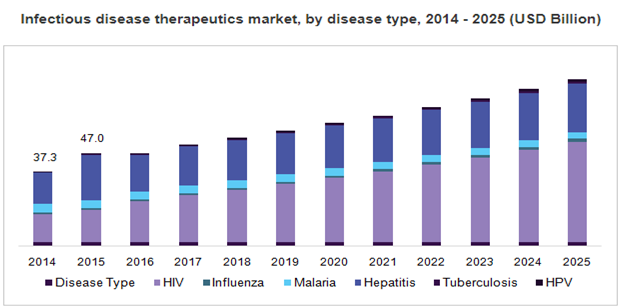
Product Insights
Reagents accounted for the global revenue share in the clinical microbiology market. This segment includes products such as solutions, primers, master mixes, and kits used in various diagnostic assays. Reagents currently takes the largest revenue share, with more than 60% attributed to repeat purchase driven by need for new set of reagents for new tests.
This segment is expected to remain dominant throughout the forecast period. Factors such as higher cost of specialized kits and constant repeat purchase are expected to drive the segment over the forecast period. The market is witnessing rising investments in research and development (R&D). Almost all analytical and therapeutic research projects demand reagents and chemicals, thereby driving penetration of reagents.
Learn More
Top most Infectious Diseases Universities in World
Infectious Diseases Universities in Europe
University of Cambridge | University of Oxford | University of Copenhagen | University College London | Swiss Federal Institute of Technology Zurich | Imperial College London | University of Zurich | Karolinska Institute | University of Manchester | University of Munich | University of Edinburgh | Pierre and Marie Curie University | Catholic University of Leuven | Heidelberg University | University of Helsinki | Freie Universität Berlin | Utrecht University | Uppsala University | Wageningen University and Research Center | University of Barcelona | Humboldt-Universität zu Berlin | University of Basel | Technical Leiden University | University of Groningen | University of Strasbourg | University of Munich | Ghent University | King's College London | University of Geneva | University of Dundee | Lund University | University of Gothenburg | University of Göttingen | University of Freiburg | Stockholm University | University of Sheffield | Eberhard Karls University, Tübingen | University of Amsterdam | University of Padua | University of Würzburg | Université Paris-Sud | University of Vienna | University of Bristol | University of Milan | University of Nottingham | University of Hamburg | University of Lisbon | Free University of Brussels | University of Oslo | University of Southampton | University of Leeds | University of Birmingham | University of Bern | University of Cologne | University of Münster | Medical University of Vienna | University College Dublin | University of Aberdeen | University of Liverpool | Trinity College Dublin | Delft University of Technology | Bielefeld University | University of Warsaw University of Leipzig | University of York | Cardiff University | University of Regensburg
Infectious Diseases Universities inUSA
Augusta University | Wayne State University | Penn University | University of Maryland | Drexel University | University Of Miami | University of Georgia | Harvard University | Washington University | University of Illinois | University of Minnesota | University of Charleston | West Virginia University | University of Wisconsin | University of Wisconsin | University of Washington | University of Appalachia | Duke University | University of California | University of Melbourne | University of Toronto | University of Pennsylvania | Cornell University | Yale University | University of Michiga | Washington University in St Louis | McGill University | University of North Carolina at Chapel Hill | Boston University | McMaster University | University of California | Northwestern University | University of British Columbia | University of Pittsburgh | New York University | Emory University | Vanderbilt University | Case Western Reserve University | University of Southern California | Tufts University | Dartmouth College | University of California, Davis | University of Wisconsin-Madison | Ohio State University | University of Virginia | University of Florida
Infectious Diseases Universities in ASIA
Osaka University | University of Tokyo | National University of Singapore | Kyoto University | Mahidol University | Tel Aviv University | University of Hong Kong | Keio University | Hebrew University of Jerusalem | Seoul National University | National Taiwan University | Sun Yat-sen University | Fudan University | Zhejiang University | Peking University | Hokkaido University | Tehran University of Medical Sciences | Tohoku University | Shanghai Jiao Tong University | Yonsei University | Korea University | Shandong University | Sungkyunkwan University | University of Ulsan | Chang Gung University | Capital Medical University | National Yang-Ming University
Infectious Diseases Associations and Societies
Aids Hilfe Wien Austria | European Centre for Disease Prevention and Control| Belgium | EATG(European AIDS Treatment Group) Belgium | ILGA Europe (The European Region of the International Lesbian, Gay,| Bisexual, Trans and Intersex Association ) Belgium | Stop AIDS alliance Belgium | Czech AIDS Help Society Czech Republic | AIDS Fondnet Denmark | Deutche AIDS-Hilfe / AIDS Action Europe Germany | Positive Voice Greece | European Society for Paediatric Infectious Diseases | HIV Ireland(Dublin AIDS Alliance CLG) Ireland| Lila (Lega Italiana per la Lotta contro l’AIDS) Italy | Global Network of People Living with HIV Netherlands | ICRSE(International Commitee on the Rights of Sex Workers in Europe) Netherlands/UK | Social AIDS Committee Poland | ARAS- Romanian Association against AIDS Romania | Alliance Global Ukraine | EATAN(European African Treatment Advocates Network) United Kingdom| Terrence Higgins Trust United Kingdom | British HIV Association | European Society for Paediatric Infectious Disease(ESPID) | European Centre for Disease Prevention and Control(ECDC) | European Society for Infectious Diseases in Obstetrics and Gynaecology (ESIDOG) | European Society of Clinical Microbiology and Infectious Diseases(ESCMID)| Italian Society of Infectious and Tropical Diseases(SIMIT)
International AIDS Society- Asia | AIDS Society of Asia and the Pacific | Australasian Society for HIV Medicine| APCASO, Thailand | Malaysian AIDS Council | Kenya's National AIDS Control Council | Japanese Association for Infectious Diseases | Asian-Pacific Research Foundation for Infectious Diseases (ARFID)| Australasian Society for Breast Disease(ASBD) | Infectious Diseases Society of Taiwan | HIV Medicine Association(HIVMA)
American Academy of HIV Medicine | American Medical Association | Association of Nurses in AIDS Care | HIV Medicine Association | International AIDS Society – USA | International Association of Physicians in AIDS Care | National Alliance of State and Territorial AIDS Directors| National Medical Association | Physicians' Research Network | American Academy of HIV Medicine | Gay and Lesbian Medical Association | AIDS Services Directory | Infectious Diseases Society of America | Brazilian Society of Infectious Diseases | American Society of Breast Disease (ASBD) | American Association for the Study of Liver Diseases(AASLD) | Association of Medical Microbiology and Infection Disease Canada(AMMI Canada) | American Society for Gastrointestinal Endoscopy | International Society for Infectious Diseases | Association of Medical Microbiology and Infectious Disease(AMMI) Canada
Transactions of the Royal Society of Tropical Medicine and Hygiene | Travel Medicine and Infectious Disease | Spatial and Spatio-temporal Epidemiology | Antimicrobial Resistance and Infection Control | New Microbes and New Infections | HIV Clinical Trials | Comparative Immunology, Microbiology and Infectious Diseases | Journal of Tropical Pediatrics | Infectious Diseases | Journal of Ophthalmic Inflammation and Infection | Journal of Infection and Chemotherapy | Transplant Infectious Disease Journal of Infection in Developing Countries | Journal of Infection and Public Health | Trials in Vaccinology | International Journal of STD and AIDS | Mediterranean Journal of Hematology and Infectious Diseases | British Journal of Biomedical Science | Journal of Chemotherapy | African Journal of AIDS Research | Iberoamericana de Micologia magazine | Journal of Water and Health | Jundishapur Journal of Microbiology | Infectious Disease Reports | The Lancet Infectious Diseases | FEMS Microbiology Reviews | The Lancet HIV | Journal of the International AIDS Society | Clinical Microbiology and Infection | Journal of Infection | Infectious Disease Clinics of North America | Frontiers in cellular and infection microbiology | Vaccine | International Journal for Parasitology | Infection Control and Hospital Epidemiology | International Journal for Parasitology: Drugs and Drug Resistance | Malaria Journal | Journal of Viral Hepatitis | International Journal of Medical Microbiology | Sexually Transmitted Infections | Journal of Clinical Virology | AIDS and Behavior | International Journal of Antimicrobial Agents | BMC Infectious Diseases | HIV Medicine | Tropical Medicine and International Health | Influenza and other Respiratory Viruses | International Journal of Tuberculosis and Lung Disease | International Journal for Parasitology: Parasites and Wildlife | AIDS Reviews | European Journal of Clinical Microbiology and Infectious Diseases | Ticks and Tick-borne Diseases | International Journal of Infectious Diseases | Journal of Hospital Infection | Diagnostic Microbiology and Infectious Disease | Pathogens and Disease
Brazilian Journal of Infectious Diseases | Journal of the Brazilian Society of Tropical Medicine | Magazine of the Institute of Tropical Medicine of Sao Paulo | Journal of Venomous Animals and Toxins Including Tropical Diseases | Chilean Journal of Infectology: official organ of the Chilean Society of Infectology | Malariology and Environmental Health Bulletin | Cuban Journal of Tropical Medicine | Infectious Diseases and Microbiology | Clinical Microbiology Reviews | Clinical Infectious Diseases | Journal of Infectious Diseases | Drug Resistance Updates | Emerging Infectious Diseases | AIDS | PLoS Neglected Tropical Diseases | Current Opinion in HIV and AIDS | Reviews in Medical Virology | Journal of Acquired Immune Deficiency Syndromes | Antimicrobial Agents and Chemotherapy | Current Opinion in Infectious Diseases | Advances in Virus Research | Infection and Immunity | Gut Microbes | AIDS Patient Care and STDs | Current HIV/AIDS Reports | Sexually Transmitted Diseases | Cellular and Molecular Immunology | American Journal of Tropical Medicine and Hygiene | Topics in antiviral medicine | Pediatric Infectious Disease Journal | Journal of the European Academy of Dermatology and Venereology | Microbiology spectrum |
Past conference
PAST CONFERENCE REPORT
12th Edition of International Conference on Infectious Diseases was organized during April 22-23, 2019 Rome, Italy With the support and contribution of the Organizing Committee Members, we successfully hosted the event at the conference venue.
Firstly we must thank you for trusting us and participating at Infectious Diseases 2019, a global platform to discuss various important aspects of Infectious Diseases and Disorders
There are infinite reasons to extend our gratitude to you for making the Infectious Diseases 2019 outstanding conference. We couldn't have done it without your continuous support and believe towards our organization, which mutually made to achieve Infectious Diseases 2019 new height in the field of Infection and Disorders
The conference was marked by the attendance of young and brilliant researchers, business delegates and talented student communities representing more than 30 countries, who have driven this event into the path of success.
The conference was organized around the theme “Developing novel technologies & treatment to cure Infectious Diseases”. The event implanted a firm relation of upcoming strategies in the field of Infectious with the scientific community. The conceptual and applicable knowledge shared, will also foster organizational collaborations to nurture scientific accelerations. Muhammad Farooq Umer, Xian Jiaotong University, China and Narendra Kumar Chopra, SEGi University, East Malaysia was the moderator of Infectious Diseases 2019. We are much thankful to Both for his great support and help.
The conference proceedings were carried out through various Scientific-sessions and plenary lectures, of which the following Speakers were highlighted as Keynote speakers Stef Stienstra, Royal Dutch Navy, Netherlands; Catherine Mullié, CHU Amiens-Picardie, France; Anna Jinxia Zhang, University of Hong Kong, Hong Kong; Chao Zhang, Zhengzhou University, China; Guangyuan Zhou, Zhengzhou University, China; Muhammad Farooq Umer, Xian Jiaotong University, China; Narendra Kumar Chopra, SEGi University, East Malaysia; Yuefei Jin, Zhengzhou University, China, Hasan Mujtaba, Xi’an Jiaotong University, China; Catherine K Derow, Catherine Kari Derow Ltd, UK, The conference witnessed anamalgamation of peerless speakers, Keynote speakers, well-known researchers and delegates who enlightened the crowd with their enviable research knowledge and on various alluring topics related to the field of Infectious Diseases through their fabulous presentations at the podium of Infectious Diseases 2019.
EuroSciCon Ltd offers its heartfelt appreciation to all the Organizing Committee Members, Chairs and Co-chairs, Speakers, Students, Media Partners and Editorial Board Members of Journal of Prevention and Infection Control, International Journal of Skin Diseases and Skin Care who supported the conference in every aspect for the awe-inspiring exhibition at the venue.
We are also obliged to various delegate experts, company representatives and other eminent personalities who supported the conference by facilitating active discussion forums. So,as continuation of Infectious Diseases 2019,We would like to heartily invite you to our upcoming 13th Edition of International Conference on Infectious Diseases scheduled May 25-26, 2020 Dublin, Ireland. We look forward to seeing your benign presence with active contribution and support to make this event successful once more.

